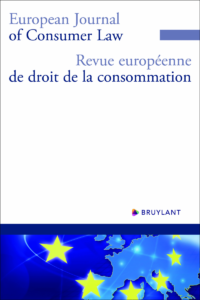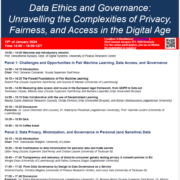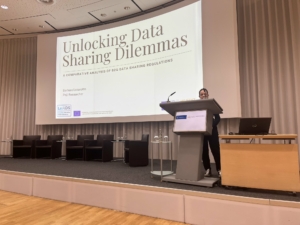The LeADS project is organising a conference, titled “Data Ethics and Governance: Unravelling the Complexities of Privacy, Fairness, and Access in the Digital Era“, in a hybrid mode at U-Residency (VUB Etterbeek Campus) on Monday, 15th January 2024. For the remote participation, you may join us here.
Below you can find the detailed programme:
14:00 – 14:05 Welcome and introductory remarks
Prof. Dimosthenis Kyriazis, Dept. of Digital Systems, University of Piraeus
Panel 1: Challenges and Opportunities in Fair Machine Learning, Data Access, and Governance
14:05 – 14:15 Introduction
Chair: Prof. Giovanni Comandé, Scuola Superiore Sant’Anna
14:15 – 14:35 The Flawed Foundations of Fair Machine Learning
Robert Poe (Scuola Superiore Sant’Anna) and Soumia El Mestari (University of Luxemburg)
14:35 – 14:55 Measuring data access and re-use in the European legal framework, from GDPR to Data Act
Tommaso Crepax (Scuola Superiore Sant’Anna), Mitisha Gaur (Scuola Superiore Sant’Anna) and Barbara Lazarotto (Vrije Universiteit Brussel)
14:55 – 15:15 Data Collaborative with the use of Decentralized Learning
Maciej Zuziak (Consiglio Nazionale delle Ricerche), Onntje Hinrichs (Vrije Universiteit Brussel), and Aizhan Abdrassulova (Jagiellonian University)
15:15 – 15:35 Discussion
Panelists:
- Dr. Laura Drechsler, KU Leuven
- Dr. Katarzyna Poludniak, Jagiellonian University
- Prof. Gabriele Lenzini, University of Luxemburg
15:35 – 15:50 Q&A
15:50 – 16:10 Coffee break
Panel 2: Data Privacy, Minimization, and Governance in Personal (and Sensitive) Data
16:10 – 16:20 Introduction
Chair: Prof. Gianclaudio Malgieri, University of Leiden
16:20 – 16:40 Contribution to data minimisation for personal data and trade secrets
Qifan Yang (Scuola Superiore Sant’Anna) and Cristian Lepore (University of Toulouse III)
16:40 – 17:00 Transparency and relevancy of direct-to-consumer genetic testing privacy & consent policies in EU
Xengie Doan (University of Luxemburg) and Fatma Sumeyra Dogan (Jagiellonian University)
17:00 – 17:20 From Data Governance by Design to Data Governance as a Service
Armend Duzha (University of Piraeus), Christos Magkos (University of Piraeus), and Louis Sahi (University of Toulouse III)
17:20 – 17:45 Discussion
Panelists:
- Prof. Elwira Macierzyńska-Franaszczyk, Jagiellonian University
- Dr. Arianna Rossi, Scuola Superiore Sant’Anna
- Dr. Afonso Ferreira, Centre National de la Recherche Scientifique
- Prof. Michail Philipakis, University of Pireaus
17:45 – 18:00 Q&A
Participation is free and open to all.
We are looking forward to sharing our research and having fruitful discussions surrounding our project.




 Consumers who logged into their Facebook account over the past weeks were surprised by a notice informing them that: “You need to make a choice to continue using Facebook. Laws are changing in your region, so we’re introducing a new choice about how we use your info for ads (…)”. Consumers subsequently had to choose between either using Facebook ‘for free’ but with personalised advertising. Or, paying for a monthly subscription without seeing ads when using Meta’s services. What had happened? In short: the European Court of Justice had decided (Case C-252/21, see in particular para 150) that Facebook needed consumers’ consent if it wanted to use their data for its advertising model. If consumers refuse to grant consent, Meta cannot use their data for advertising purposes.
Consumers who logged into their Facebook account over the past weeks were surprised by a notice informing them that: “You need to make a choice to continue using Facebook. Laws are changing in your region, so we’re introducing a new choice about how we use your info for ads (…)”. Consumers subsequently had to choose between either using Facebook ‘for free’ but with personalised advertising. Or, paying for a monthly subscription without seeing ads when using Meta’s services. What had happened? In short: the European Court of Justice had decided (Case C-252/21, see in particular para 150) that Facebook needed consumers’ consent if it wanted to use their data for its advertising model. If consumers refuse to grant consent, Meta cannot use their data for advertising purposes.


 Barbara presented her research titled “Unlocking Data Sharing Dilemmas: A Comparative Analysis of Business-to-Government Data Sharing Laws and the European Data Act Proposal”, a presentation that aimed to explore the delicate balance between sharing and accessing privately held data by governments and the data monopolies held by big tech companies.
Barbara presented her research titled “Unlocking Data Sharing Dilemmas: A Comparative Analysis of Business-to-Government Data Sharing Laws and the European Data Act Proposal”, a presentation that aimed to explore the delicate balance between sharing and accessing privately held data by governments and the data monopolies held by big tech companies. Barbara’s presentation also delved into the potential advantages of redistributing data value to society. She emphasized the opportunity to challenge the status quo and break down data monopolies, creating a more equitable system where the benefits derived from privately held data are shared with the broader community. This exploration was identified as crucial for policymakers seeking to strike a balance between fostering innovation and protecting individual privacy.
Barbara’s presentation also delved into the potential advantages of redistributing data value to society. She emphasized the opportunity to challenge the status quo and break down data monopolies, creating a more equitable system where the benefits derived from privately held data are shared with the broader community. This exploration was identified as crucial for policymakers seeking to strike a balance between fostering innovation and protecting individual privacy.